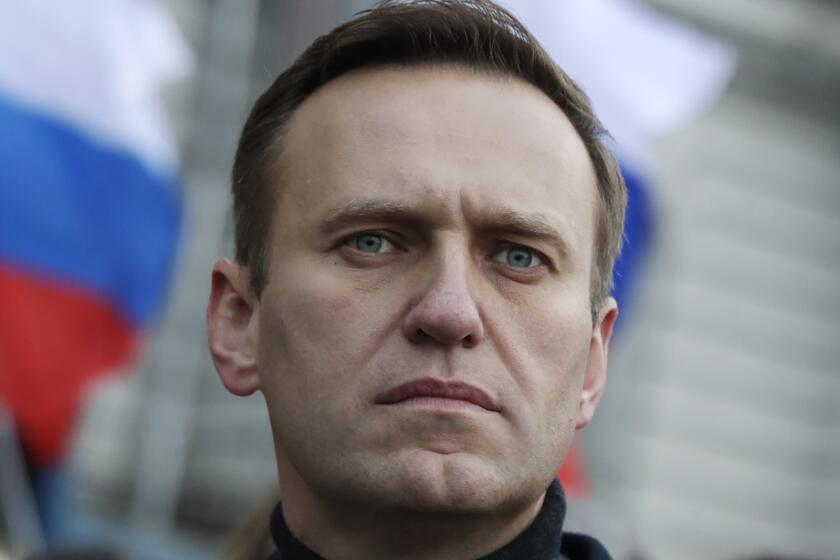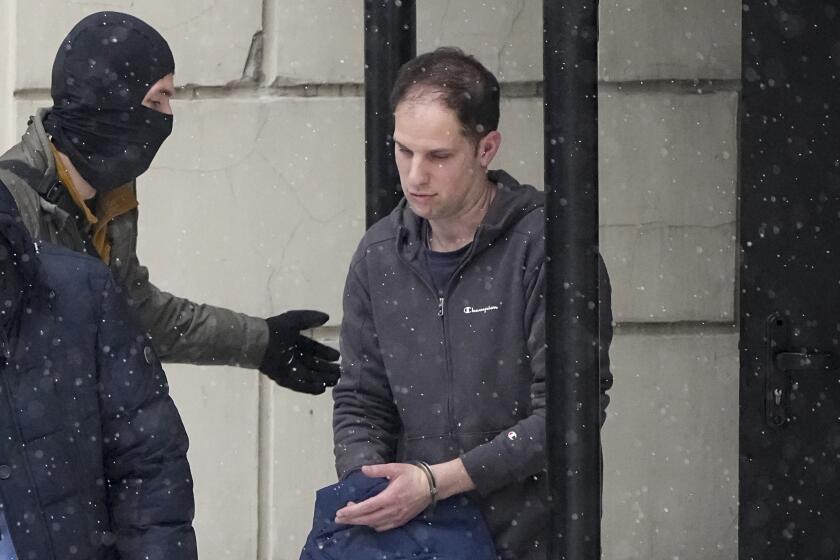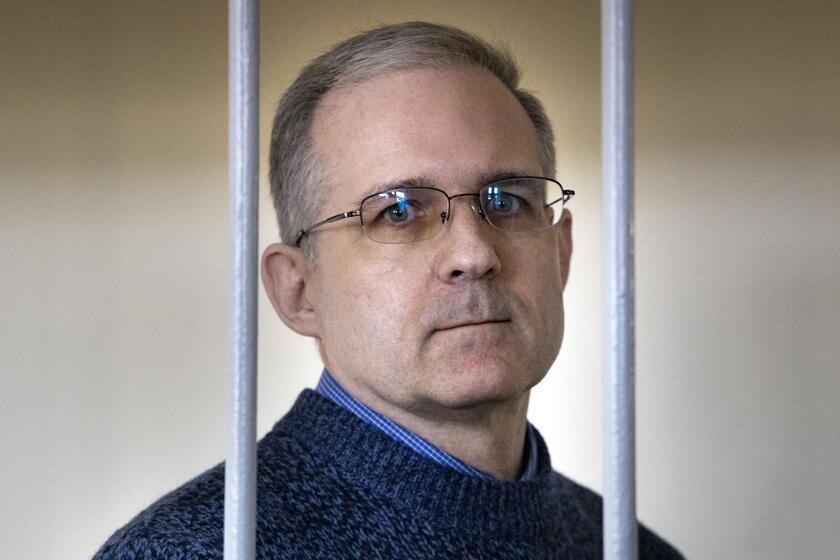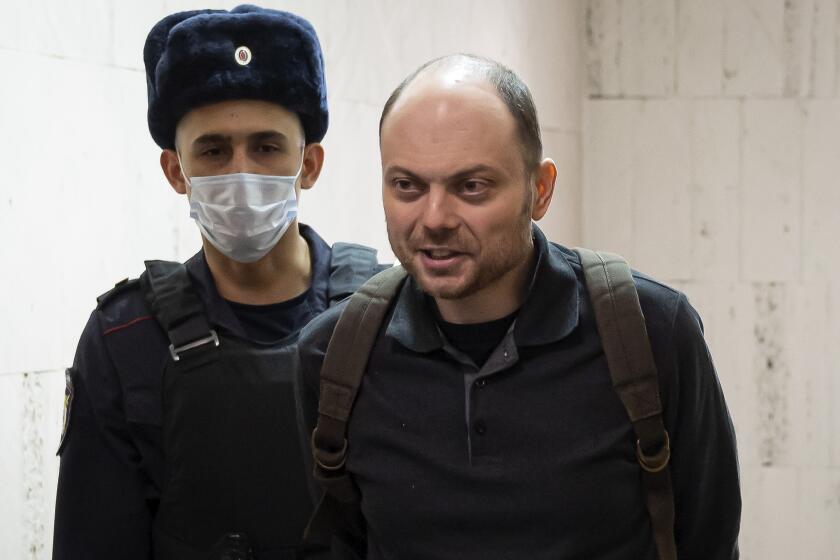Russia’s political prisoners endure isolation, poor food and arbitrary punishment
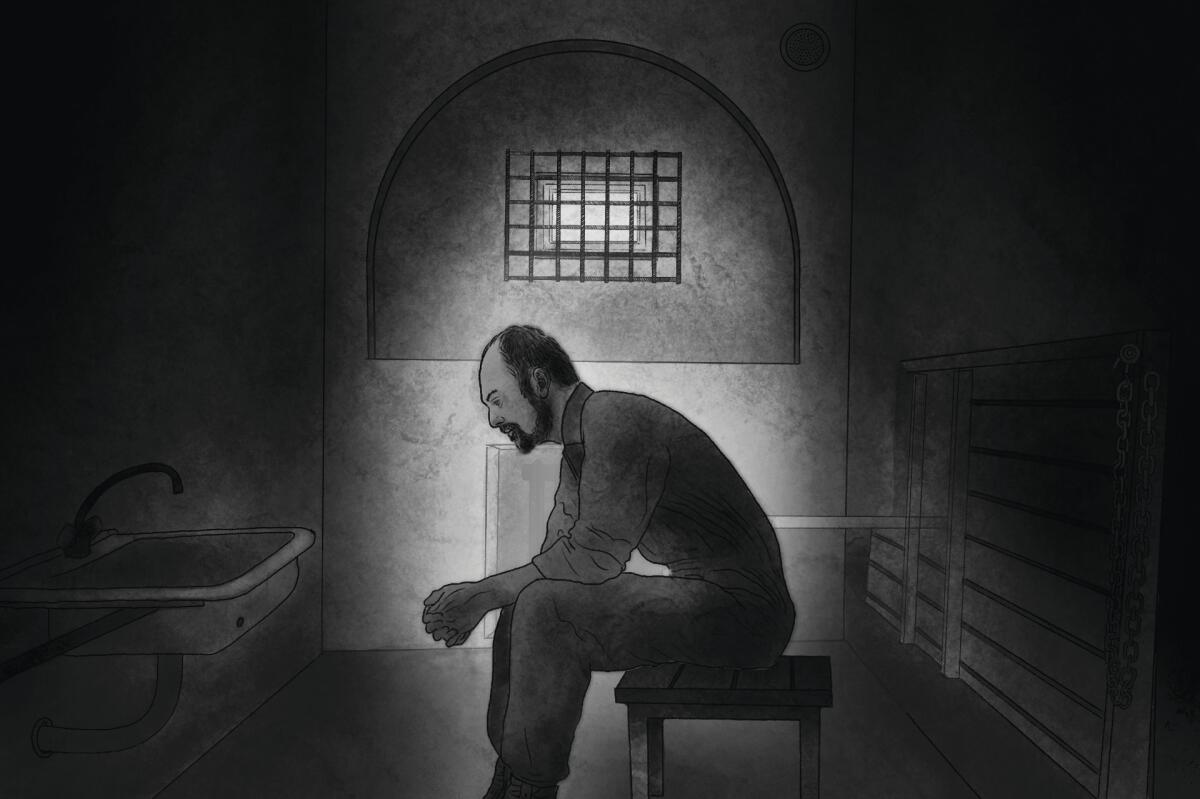
- Share via
TALLINN, Estonia — Vladimir Kara-Murza could only laugh when officials in Penal Colony No. 6 inexplicably put a small cabinet in his already-cramped concrete cell, next to a fold-up cot, stool, sink and latrine.
That moment of dark humor came because the only things he had to store in it were a toothbrush and a mug, said his wife, Yevgenia, since the opposition activist wasn’t allowed any personal belongings in solitary confinement.
Another time, she said, Kara-Murza was told to collect his bedding from across the corridor — except that prisoners must keep their hands behind their backs whenever outside their cells.
“How was he supposed to pick it up? With his teeth?” Yevgenia Kara-Murza told the Associated Press. When he collected the sheets, a guard with a camera appeared and told him he had violated the rules, bringing more discipline.
Alexei Navalny, Russia’s best-known opposition figure, has died in a prison colony, authorities say. Biden and other Western leaders blame Putin.
For political prisoners like Kara-Murza, life in Russia’s penal colonies is a grim reality of physical and psychological pressure, sleep deprivation, insufficient food, healthcare that is poor or denied, and a dizzying set of arbitrary rules.
This month brought the stunning news from a remote Arctic penal colony, one of Russia’s harshest facilities: the still-unexplained death of Alexei Navalny, the Kremlin’s fiercest foe.
“No one in the Russian penitentiary system is safe,” says Grigory Vaypan, a lawyer with Memorial, a group founded to document repression in the Soviet Union, especially from the Stalinist prison system known as the gulag.
“For political prisoners, the situation is often worse, because the state aims to additionally punish them, or additionally isolate them from the world, or do everything to break their spirit,” Vaypan said. His group counts 680 political prisoners in Russia.
Kara-Murza was convicted of treason last year for denouncing the war in Ukraine. He is serving 25 years, the stiffest sentence for a Kremlin critic in modern Russia, and is among a growing number of dissidents held in increasingly severe conditions under President Vladimir Putin’s political crackdown.
A Russian American woman from Los Angeles is held in Russia on treason charges, apparently over a donation to a charity for Ukraine.
THE GULAG’S LEGACY
Former inmates, their relatives and human rights advocates paint a bleak picture of a prison system that descended from the USSR’s gulag, documented by Alexander Solzhenitsyn in “One Day in the Life of Ivan Denisovich” and “The Gulag Archipelago.”
While undergoing reforms, it “more or less still has the backbone of the Soviet system,” says Oleg Kozlovksy, Amnesty International’s Russia researcher.
Most often, inmates live in barracks tightly packed with bunk beds. Konstantin Kotov, an activist who spent over a year in Penal Colony No. 2 in the Vladimir region — Navalny’s prison from 2021 until June 2022 — recalls cramped quarters of up to 60 men per room.
Not even the pandemic changed that, Kotov told AP. Masks were required from 6 a.m. until 10 p.m., but he doubts they helped much. “Every now and then, people had high fever. They were taken to the infirmary, then brought back, and that was it,” he said.
Meals are basic and unsatisfying.
A court in Moscow ruled to keep Wall Street Journal reporter Evan Gershkovich in custody pending his trial on espionage charges.
Breakfast was porridge, lunch was soup with little or no meat, mashed potatoes and a meat or fish cutlet; as was dinner, Kotov said. Inmates got two eggs a week, and fruit and vegetables were a luxury almost always sold out at prison kiosks, he added.
“The ration is not enough, and often it’s inedible. So almost no one lives on rations alone,” Navalny once said. His wife described his meals as porridge for breakfast, soup and porridge for lunch, and porridge with herring for dinner.
Additional food is sold, or relatives can send parcels, within limits. Those in punishment cells get no packages.
There is a strict regimen of menial tasks and duties, like cleaning and standing at attention.
Andrei Pivovarov, serving four years for running a banned political organization, must clean his solitary cell for several hours a day and listen to a recording of prison regulations, says his wife, Tatyana Usmanova. But he can’t do both at the same time, or finish quickly and rest, she added. Guards watching via CCTV punish rule breakers.
Russia freed WNBA star Brittney Griner in a dramatic high-level prisoner exchange, with the U.S. releasing notorious Russian arms dealer Viktor Bout.
A ‘SYSTEM OF SLAVERY’
There are just under 700 penitentiary facilities in Russia, and most are penal colonies of varying security, from minimum to “special regime.” There are about 30-40 penal colonies for women.
Political prisoners tend to be sent to those whose administrations hold tighter controls, says Zoya Svetova, a journalist and prisoner rights advocate.
Inmates are required to work, but often there are not enough tasks for men. Women usually sew uniforms for the military, police and construction workers, working long hours for meager pay, said prisoner advocate Sasha Graf.
Nadya Tolokonnikova, a member of the Pussy Riot protest group who was in prison for nearly 22 months in 2012-13, recalls sewing for 16- to 18-hour shifts. “It’s a system of slavery, and it is truly horrible,” she told the AP.
Inmates are supposed to be paid not less than minimum wage -– 19,242 rubles (about $200) a month in 2024 -– but in reality it’s as little as 300 rubles (about $3.20) — enough to buy cigarettes and sanitary products at the prison kiosk, Graf said.
The Moscow City Court on Monday convicted Paul Whelan on charges of espionage and sentenced him to 16 years in a maximum security prison colony.
INTIMIDATION AND REPRESSION
Tolokonnikova said that when she arrived at Penal Colony No. 14 in the Mordovia region the warden described himself as a “Stalinist.” She said he told her: “You may be a somebody outside of this colony, have a voice, people who support you and care for you, but here, you are in completely in my power, and you need to understand this.”
Although prisons are technically overseen by commissions that do inspections and advocate for inmates, their members in recent years have been replaced by government loyalists, says Svetova, who served on a commission from 2008 to 2016.
She said the current government uses prisons for intimidation and oppression.
Reports of physical abuse are common for ordinary inmates but rare for political prisoners, advocates say. Instead, intimidation often comes via enforcing minor infractions, said Amnesty’s Kozlovsky.
Navalny spent months in a punishment cell for not buttoning his uniform properly or not putting his hands behind his back when required. He once described it as a “concrete kennel,” about 8 by 10 feet, that, depending on the season, was “cold and damp,” or “hot and there’s almost no air.”
Long stints in punishment cells or other types of solitary confinement are a reality for many, and their only lifeline is a visit from a lawyer or writing letters that are censored and sometimes take weeks to arrive; some colonies use a faster online service.
As questions swirl over how Wagner boss Yevgeny Prigozhin’s plane crashed, many note that other Kremlin foes have met suspicious and violent ends.
A TOLL ON PRISONERS’ HEALTH
Healthcare is almost nonexistent, current and former inmates and advocates say, with only basic medications available, if at all.
“Prison guards by default believe the inmate is faking and only complaining about health issues to get some kind of extra privileges,” said Tolokonnikova.
Not surprisingly, inmates don’t fare well in such conditions.
Yevgenia Kara-Murza said her 42-year-old husband’s health has worsened in solitary.
He suffered two near-fatal poisonings in 2015 and 2017 and developed polyneuropathy, a condition that deadens the feeling in his limbs. While he received some treatment in pretrial detention in Moscow, there has been none at the penal colony in Omsk, his wife said.
A court in Moscow has convicted a top Kremlin foe on charges of treason and denigrating the Russian military and sentenced him to 25 years in prison.
“He needs physical therapy, exercise,” which is hardly possible in his cell, she said.
Alexei Gorinov, a former member of a Moscow municipal council serving seven years for speaking against the war in Ukraine, suffers from a chronic respiratory condition and had part of a lung removed before he was imprisoned. His health deteriorated during six weeks in solitary confinement, and he is still recovering.
In December, Gorinov, 62, was not strong enough to sit up in a chair or even speak, his allies quoted his lawyer as saying. Eventually moved to a prison hospital, he is still awakened every two hours because he’s labeled a flight risk and authorities must regularly confirm his whereabouts, supporters say. He considers it a form of torture.
While public pressure helped stop prison abuses in recent years, Memorial’s Vaypan believes a line has been crossed with Navalny’s death.
It’s a “worrying signal” that things could get worse, he said.
More to Read
Sign up for Essential California
The most important California stories and recommendations in your inbox every morning.
You may occasionally receive promotional content from the Los Angeles Times.
